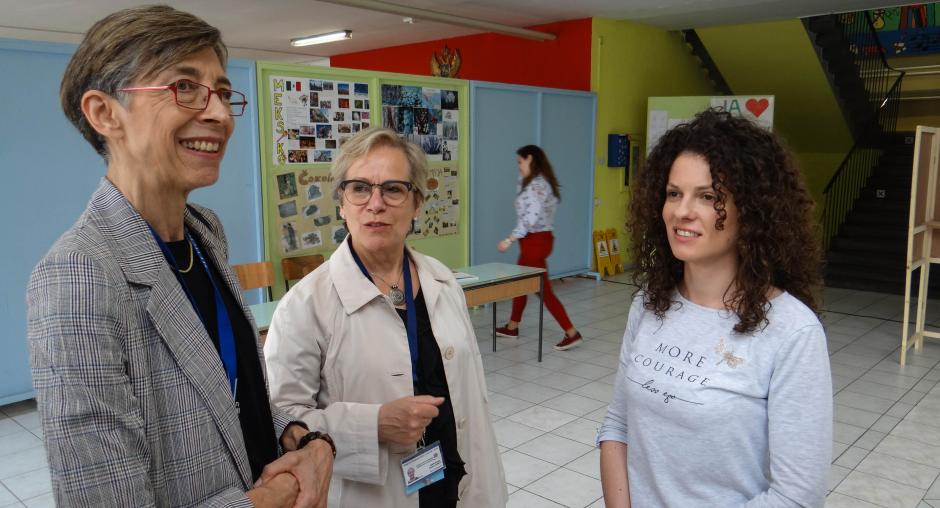Fundamental freedoms respected in Montenegro presidential election, governing party candidate had institutional advantage, international observers say

PODGORICA, 16 April 2018 – Fundamental freedoms were respected in the 15 April Montenegro presidential election, although the governing party candidate held an institutional advantage, the international observers concluded in a preliminary statement today. Candidates campaigned freely, and the media provided the contestants with a platform to present their views, but the lack of analytical reporting and absence of the frontrunner in the televised debates reduced voters’ opportunity to make an informed choice, the statement says.
The technical aspects of the election were adequately managed, although the transparency and professionalism of the State Election Commission (SEC) remain issues of concern. Election day proceeded in an orderly manner, despite a few procedural irregularities, the observers said.
“It is important that fundamental freedoms of assembly and speech, for example, were respected in this election, and that the candidates were able to campaign freely and to reach voters through the media,” said Tana de Zulueta, head of the long-term election observation mission from the OSCE Office for Democratic Institutions and Human Rights. “At the same time, they were not able to compete on a level playing field, as the frontrunner enjoyed the advantages that the ruling party, which he leads, has consolidated over its 27 years in power.”
The campaign activities of the seven candidates who ran in the election – six men and, for the first time, a woman – were generally low-key. Opposition and civil society representatives voiced concerns about alleged widespread hiring of public employees, despite the restriction on doing so during election period, as well as vote-buying and the collection of identification documents to prevent some voters from casting ballots. These recurrent allegations of pressure on voters to support the ruling party candidate had a negative impact on the campaign environment.
The public broadcaster fulfilled its duties to provide candidates with free airtime, organized interviews with candidates and aired two debates, although the candidate nominated by the governing party did not take part. Private media outlets monitored were aligned along political lines. With no legal limits on the amount of paid advertising, candidates who could afford to purchase more airtime had an advantage, the observers said.
“Yesterday, voting was well organized, and voters made their choice among a wide range of candidates. As for the election campaign, there were reported cases of misuse of state resources and credible allegations of pressure on voters in favour of the ruling party candidate,” said Jonas Gunnarsson, head of the delegation from the Parliamentary Assembly of the Council of Europe (PACE). “Regrettably, those problems are recurrent from past elections in Montenegro. Television debates among presidential candidates are a democratic procedure allowing voters to make an informed choice, and the PACE delegation regrets that the ruling party candidate did not take part in the debates.”
Candidates could use public and private funds for campaigning and receive monetary and in-kind donations from individuals and legal entities. They were required to report regularly during the campaign and submit final reports, to be published online, within 30 days of election day. Candidates received private donations mostly from individuals, and predominantly spent the funds on campaigning in the media.
The laws related to elections provide a sound basis for the conduct of democratic elections, and recent amendments incorporating a number of ODIHR and Council of Europe Venice Commission recommendations signaled a general willingness to engage in electoral reform, the statement says. There were, however, omissions and ambiguities, such as the lack of regulations on the verification of supporting signatures or sanctions for violations related to these. The lack of regulations on dispute resolution procedures, tabulation of results and campaign finance also undermined the integrity of the electoral process. Attempts by the SEC to clarify some aspects of the law through instructions and decisions lacked consistency.
“While fundamental freedoms were, indeed, respected, and the management of the election was positive, work is still needed on the laws governing elections, and on electoral reform in general,” said Fabio Massimo Castaldo, head of the European Parliament delegation. “The relevant political actors in Montenegro will need to work together to effectively address these shortcomings, as a step along the path toward realizing their European aspirations.”
Voters, candidates and the entities who nominate them may challenge actions and decisions of election commissions at higher-level commissions, and voters filed over 1,000 complaints, alleging forgery of supporting signatures or the misuse of personal data in lists of these signatures. Three complaints regarding the appointment of polling station chairpersons were filed with the SEC and one with a lower commission in the pre-election period. In practice, election dispute resolution depends on the discretion of different public authorities, which at times failed to ensure effective legal redress.
The SEC met most of the legal deadlines but lacked transparency, as decisions were not published, and its sessions were not open to the media. Although it held regular sessions, these were insufficiently prepared and organized. The election law does not contain provisions requiring impartiality and professionalism of members of election management bodies, and SEC members from opposition parties, representatives of the media and of citizen observer organizations expressed concerns that decisions were made along party lines. Municipal election commission sessions were mostly open to observers, and some of these commissions posted their decisions.
For further information contact:
Thomas Rymer, OSCE/ODIHR, +382 69 364 341 or +48 609 522 266, thomas.rymer@odihr.pl
Chemavon Chahbazian, PACE, +382 69 364 366, chemavon.chahbazian@coe.int
Tim Boden, EP, at +382 067 948 752 or +32 498 98 13 64, timothy.boden@ep.europa.eu
